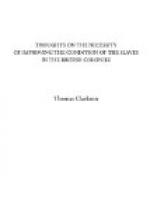creature called a slave. Hence it is slow
to adopt helps, with which a beneficent Providence
has furnished us, by giving to man an inventive faculty
for easing his burthens, or by submitting the beasts
of the field to his dominion and his use, and it flies
to expedients which are contrary to nature and reason.
How then can such a system ever answer? Were
an English farmer to have recourse to such a system,
he would not be able to pay his rent for a single
year. If the planters then are in distress, it
is their own fault. They may, however, thank
the abolitionists that they are not worse off than
they are at present. The abolition of the slave
trade, by cutting off the purchase of new slaves,
has cut off one cause of their ruin[17]; and it is
only the abolition
of slavery which can yet save
them. Had the planters, when the slave trade
was abolished, taken immediate measures to meet the
change; had they then revised their laws and substituted
better; had they then put their slaves into a state
of preparation for emancipation, in what a different,
that is, desirable situation would they have been
at this moment! In fact,
nothing can save them,
but the abolition of slavery on a wise and prudent
plan. They can no more expect, without it,
to meet the present low prices of colonial produce,
than the British farmer can meet the present low prices
of grain, unless he can have an abatement of rent,
tithe, and taxation, and unless his present poor rates
can be diminished also. Take away, however, from
the planters the use and practice of slavery, and
the hour of
their regeneration would be begun.
Can we doubt, that Providence would then bless their
endeavours, and that
salvation from their difficulties
would be their portion in the end?
It has appeared, I hope, by this time, that what I
have been proposing is not unreasonable, and that,
so far from being injurious to the interests of the
planters, it would be highly advantageous to them.
I shall now show, that I do not ask for the introduction
of a more humane system into our Colonies at a
time when it would be improper to grant it; or
that no fair objection can be raised against the present
moment, as the fit era from whence the measures
in contemplation should commence. There was,
indeed, a time when the planters might have offered
something like an excuse for the severity of their
conduct towards their slaves, on the plea that the
greater part of them then in the colonies were African-born
or strangers, and that cargoes were constantly
pouring in, one after the other, consisting of the
same sort of beings; or of stubborn ferocious people,
never accustomed to work, whose spirits it was necessary
to break, and whose necks to force down to
the yoke; and that this could only be effected
by the whip, the chain, the iron collar, and other
instruments of the kind. But now no such
plea can be offered. It is now sixteen years since




